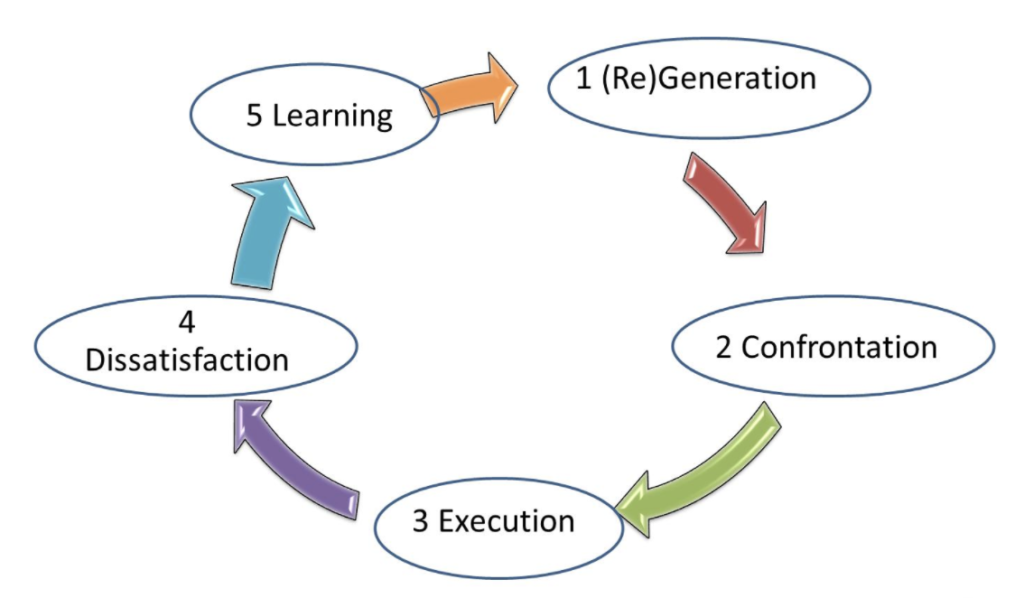Enjoy dynamic listening on the go—this podcast, AI-generated for your convenience, is perfect for driving, commuting, or waiting in line!
If you are among those lucky people who are able to generate far more ideas than realistically doable, I have a model for your pipeline management: it’s based on the life cycle ideas concept. This means a circular process, where you come back to the starting point a fair number of times.
For each stage, there is one main emotional mindset, and one skill. It will help you to cope with your own ideas overload. To avoid feeling overwhelmed, it is important to accept this reiteration:

1. Generation phase – Thinking skills + Enthusiasm
Whether you are more of a strategic, analytical or creative thinker – a very active brain finds its nurturing in moments of quietness and pause, when doing gives finally some way to thinking. This is indeed the generation phase. You will collect lots of notes, sketches, half-cooked sentences whose meaning you will be unable to figure out one month – or just one week – later, if not properly recorded. Just get out of the shower… or pull over, and jot them down, or use the vocal note function of your smartphone.
You should then categorize first ideas by topic and by urgency/priority: highly urgent are those simple ideas that can provide immediate benefits (the so called “low hanging fruits”); while high priority and more time must be allocated to ideas that require planning, resources and alignment with other people. Those will be typically the main victim of your procrastination skills…
2. Confrontation phase – Communication skills + Realism
To move on and bring our ideas to life, we need collaboration: we won’t get very far by ourselves. So this is when you have to clearly communicate your point, and express your mind, to someone else. The conversation following the generation phase might be very painful and frustrating, but is very useful. You will include points of view that weren’t considered in the first, enthusiastic instance.
My advice here is:
- Never trash an idea, even if you are reasonably talked out of it and decide to give up.
- Create a repository instead. Opening up your idea repository some months, or even years later, might be enlightening to you (will talk this later!). In this phase you will treasure some feedback, and you will disregard some other: as long as you keep a positive and constructing attitude, this is ok. Don’t hesitate to inform others about your decisions (like “thank you very much for your advice that I have carefully analyzed. I have decided to pursue this idea, for a. b. c. reasons)
3. Execution Phase – Operative skills + RESILIENCE
Following confrontation, good ideas adjust and often change into something different. But ultimately they must inspire an action. When you move from ideas to actions, you will face stress, frustration and you will need a lot of organization skills. Yet above all you will need resilience, ie the ability to recover from hard blows and grow stronger. At this stage, ideas may turn out to be wrong, or (much trickier case) the idea itself could be right, but the execution is flawed (and nobody can see the difference). Despite the tough moments, we are learning a lot more by facing reality, than by leaving an idea in a closet.
Through imperfection, we are creating something that didn’t exists before.
4. Dissatisfaction phase: learning, learning, learning
When the “doing” loses momentum and slows down, adrenaline plunges, and areas of improvement start prevailing on the achievements: you feel a sense of dismay. Don’t give up: the brain is active again and you are ready for a new generation stage, as long as you keep learning. Believe me, it’s a positive moment: without dissatisfaction, new ideas never flow.
5. Re-generation: rethink and restart
Now open up your repository again: you will gain a lot of useful insights. Some apparent dead ends may acquire new meaning, and new possible way outs may appear. Other ideas, which were parked due to lack of resources, could be restarted or delegated. Others were completely forgotten and now make perfect sense: too often I realized that I wasn’t wrong, I was just too much ahead of time. So, this is the right moment to restart imagination and enthusiasm.
Don’t be overpowered by your own ideas: own them, guide them, and enjoy!
